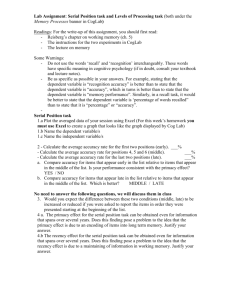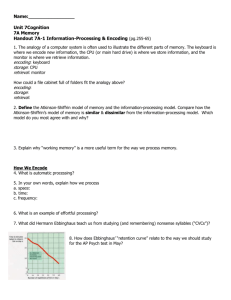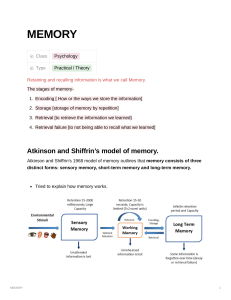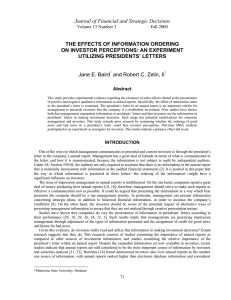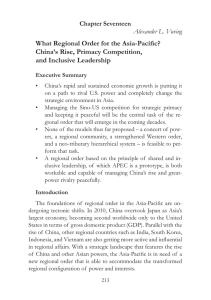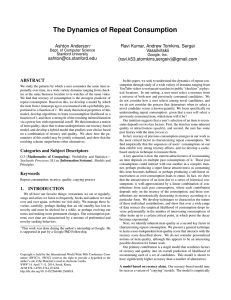Improve Your Memory Presented by Ingrid Riener Student Services The University of Queensland
advertisement
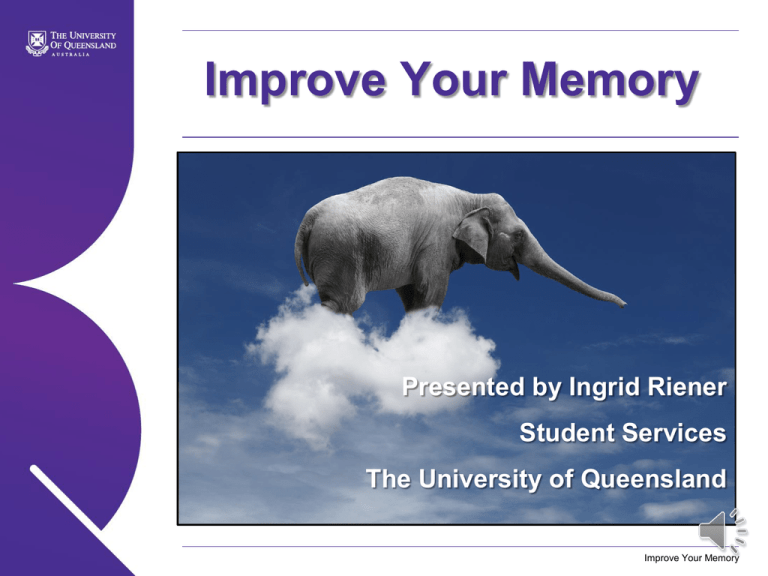
Improve Your Memory Presented by Ingrid Riener Student Services The University of Queensland Improve Your Memory Test or exam coming up? Improve Your Memory Your current strategies and techniques? Rose Statue How would you go about memorising this list? Italy Assets Envy Biochemistry Zimbabwe Art Reflection Width Democracy Agoraphobia Oranges Improve Your Memory Learning in an academic context • Make sense of new material • Organise material: patterns and linking • Revise what you’ve learned • memory techniques • revision strategies Improve Your Memory Your approach to learning? Rote learning? Meaningful learning? Trying to remember something by going over it or repeating it over and over again Making sense of something before trying to memorise it Improve Your Memory Make sense of the material • Understand material and make it meaningful: • material that makes sense to you is easier to learn • try to identify purposes for learning and look for practical applications • Learning builds on learning: • look for opportunities to associate new information with old material Improve Your Memory Organise your learning content • Break material down into manageable chunks that are more easily understandable • Explore how new ideas fit in with what you already know • Identify patterns, categories, stories, and sequences in the material • link new items with existing patterns and categories • Develop concept maps to show how new information fits into the bigger picture Improve Your Memory Patterns • Try to identify a rule, organising principle or pattern in the material e.g. to memorise Australia’s states, start with states in the East and move to those in the West Western Australia Queensland Tasmania Improve Your Memory Linking • As you would prepare a canvas for paint, prepare your mind for new material by pre-reading for lectures • helps you to link new information to what’s already known or familiar • increases retention rates Improve Your Memory Make it memorable! • Imagine how something works or what it looks like (and draw it) • Transform the material into something new • e.g. convert linear text into a table or flow chart • Use all your senses to enliven the content Improve Your Memory Playfulness • Be PLAYFUL • use humour and doodle! Improve Your Memory Rhymes • Use rhymes to make content more meaningful (and therefore easier to remember) • e.g. ‘Id is the kid!’ (Freud) ‘Thirty days hath September, April, June and November …’ Improve Your Memory Visualisation • Link unfamiliar content with what’s familiar • e.g. the loci method: visually associate new material with a familiar location Improve Your Memory Other techniques • Analogies: e.g. a biological cell as a city • Acronyms: e.g. LASER (Light Amplification by Stimulated Emission of Radiation) you make up appropriate acronyms using the first letter of each word in your list • Acrostics: e.g. Order of taxonomy in biology Kingdom, Phylum, Class, Order, Family, Genus, Species (Kids Prefer Cheese Over Fried Green Spinach) Improve Your Memory Revision strategies • Revise sections or chunks of work 3 to 5 times in preparation for exams or tests • Leave appropriate gaps between revision sessions • Use hooks or clues (like acronyms or visualisations) so that stored material can be recalled when needed • Make good use of primacy and recency effects Improve Your Memory Likelihood of remembering Primacy and recency effects Beginning End Position in list Improve Your Memory Primacy and recency effects • Primacy effect: items at the beginning of a list are more easily remembered (little interference) • Recency effect: last few items are likely to be remembered (still in working memory) • Keep study sessions relatively short to make good use of these effects • Revise key information at the beginning and end of study sessions, but also … • vary what material you start and end a study session with Improve Your Memory The benefits of self-testing Improve Your Memory Self-testing: tips • Use past exam papers and questions and exercises from tutorials and text books to test yourself • Predict questions and multiple-choice distractors in exams and use them to test yourself (and members of your study group?) • Try to replicate exam conditions wherever possible: venue, time allocation and atmosphere Improve Your Memory
